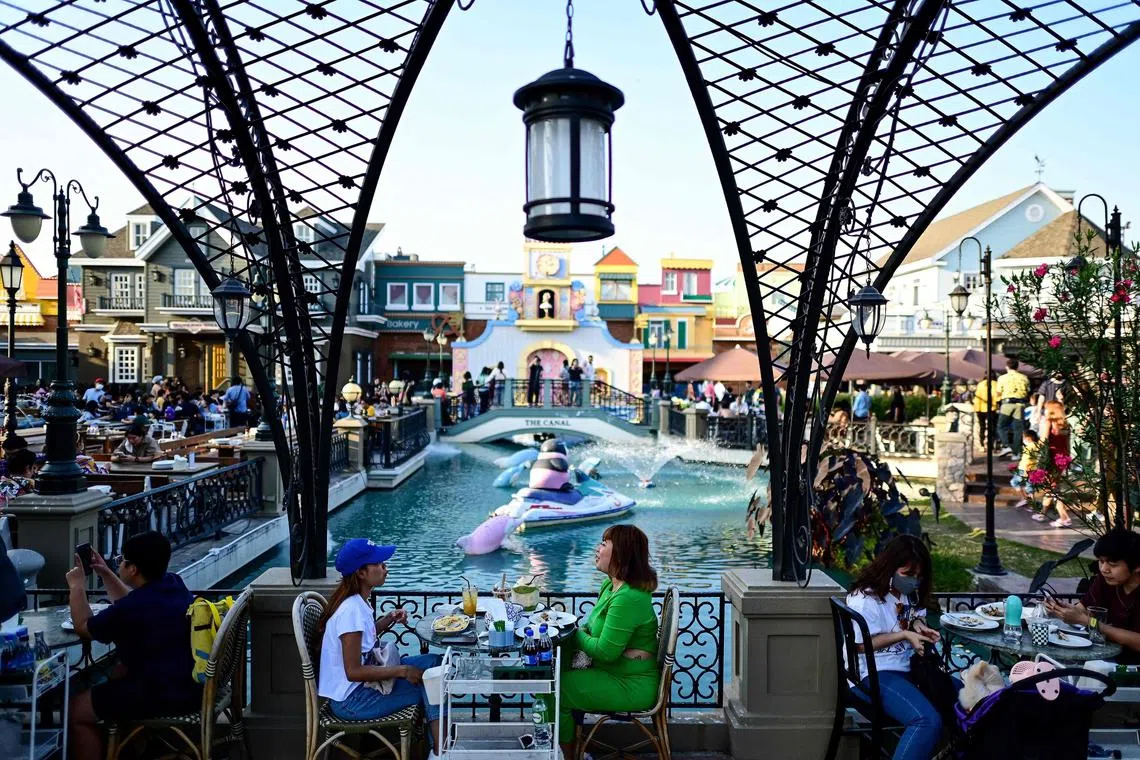With few Covid-19 entry tests, South-east Asia may gain most from China's travel revival
Sign up now: Get ST's newsletters delivered to your inbox

Thailand already expects to welcome five million Chinese travellers in 2023, or about half of the 10.99 million of 2019.
PHOTO: AFP
Follow topic:
SINGAPORE - South-east Asian economies are set to be leading beneficiaries of China’s scrapping of travel bans as they have steered clear of the Covid-19 tests before entry that Europe, Japan and the United States have imposed on Chinese visitors.
Even as the virus tears through its 1.4 billion population, the world’s second largest economy is reopening its borders from Sunday,
Such newly mobile Chinese tourists will opt for “minimal hassle” and head for destinations that do not demand testing, which in turn stands to benefit South-east Asia, said CIMB economist Song Seng Wun.
“The busier regional airports are, the better it is for their economies,” he added.
While Australia, Britain, India, Japan and the United States are among the nations that require a negative Covid-19 test from inbound travellers from China, South-east Asian countries, from Cambodia to Indonesia to Singapore, have all eschewed such requirements.
Except for airplane wastewater testing by Malaysia and Thailand for the virus, the region’s 11 nations will treat travellers from China like any other.
“We are not taking the stance of discriminating (against) any countries,” said Malaysian Prime Minister Anwar Ibrahim.
Interest in the region waxed high even before news of its lack of test requirements.
As many as 76 per cent of Chinese travel agencies ranked South-east Asia as the top destination when outbound travel resumed, according to a survey released in December by trade show ITB China.
Welcome back
The region is home to many tourism-reliant economies where the Chinese used to make up the bulk of visitors to beach paradises, luxury malls and casinos that have all been hit hard by their absence in the last few years.
Now, their tourism industries are gearing up to welcome Chinese travellers back.
In 2019, 155 million Chinese travelled abroad, spending US$254.6 billion (S$343 billion), or close to the gross domestic product (GDP) of Vietnam, said Citi, whose researchers expect “meaningful recovery” in mass tourism to start in the second quarter of 2023.
In Vietnam, almost a third of the 18 million foreign arrivals in 2019 were from China, while about a fifth of Singapore’s international arrivals were Chinese who spent $900 million.
Thailand already expects to welcome five million Chinese travellers in 2023, or about half of the 10.99 million in 2019. Tourism accounted for nearly 20 per cent of Thailand’s national income before the pandemic, with China its largest source of foreign tourists.
“This is an opportunity to restore our economic situation and recover from losses we suffered for nearly three years,” Thai Public Health Minister Anutin Charnvirakul said on Thursday.
Malaysia projects 1.5 million to two million Chinese tourists in 2023 versus three million before the pandemic.
And the Malaysian Association of Tour and Travel Agents is preparing for a road show in Chinese cities to woo visitors, said its vice-president Ganeesh Rama.
Few health worries
Officials have downplayed health worries aired by other countries, such as the United States’ concern over insufficient information and fear that more cases in China could spawn new variants of the virus.
Singapore said it had high population immunity, as about 40 per cent of its people had been infected with the coronavirus and 83 per cent had been vaccinated, while it has bolstered healthcare capacity.
Dr Karen Grepin, a public health professor at Hong Kong University, agreed with that approach, adding: “Every day, countries import thousands of cases of Covid-19 from around the world.”
In Bali, Ms Ida Bagus Agung Parta, chairman of the resort island’s tourism board, said it would “increase our defence”, as workers take a second booster dose of vaccine this month.
Mr Kadek Sucana, who runs a seafood restaurant in the Jimbaran area, told AFP: “Before the pandemic, we had a lot of Chinese customers... At least 100 to 200 customers came daily.”
He is hoping for a “full house again... because Chinese tourists come in large groups”.
Cambodia’s Prime Minister Hun Sen, an ally of Beijing, described other countries’ testing requirements as “propaganda” designed to “scare people”.
“Whatever other countries want to do, it’s their right,” Mr Hun Sen said in a recent speech. “But for Cambodia, it’s an invitation to Chinese people: Chinese tourists, come to Cambodia.” REUTERS, AFP

